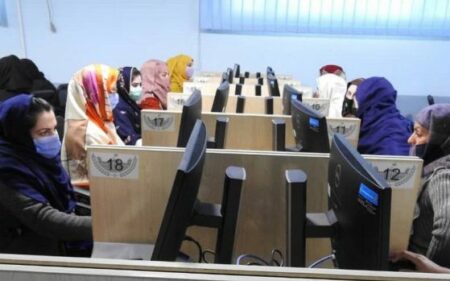United Nations humanitarian aid to the people of Afghanistan has been provided by domestic and foreign non-governmental organizations in all provinces of Afghanistan in the last 15 months.
These aids include foodstuffs, cash, agricultural tools, and work in exchange for food, which has been provided in different provinces and has benefited more than 300,000 families in Balkh province so far.

Following the prohibition of women from working in domestic and foreign non-governmental organizations, a number of women in Balkh province have complained about the lack of sources of income for them and say that after this, they have to beg to support their families.
Najiba, a woman who has three children, is satisfied with the distribution of humanitarian aid and says that she does not know what will happen to her family and herself in the absence of this aid.
‘I go three or four times a day to buy stale bread because it is cheaper than fresh bread for four Afghanis.’
Najiba’s husband, who is sick, was introduced to a six-month period of aid by the World Food Organization with the help of the regional office, and through this program, she obtained a monthly bag of flour, a can of oil, and some beans and peas.
It is not only Najiba who has received humanitarian aid in Balkh province, but according to official statistics, 199,224 families have been given food and 67,168 families have received cash assistance from 3 to 22 thousand Afghanis.
Domestic and foreign organizations in Balkh province have provided the mentioned aid to the people by male and female employees after the surveys.
Fawzia and an employee of the foreign organization in Balkh Province, who is currently out of work, says that if women do not return to their duties, not only our families will face poverty and destitution, but also hundreds of families. They will be deprived of humanitarian aid in Balkh Province.
‘I am a breadwinner for my family, and with the work, I do in the office and receive a salary and support my family, I will be poor if I lose my job permanently.’

She says, her duty was in the survey office. She would go into people’s houses, observe their lives closely and identify the people deserving of aid. According to her, men can’t do that.
(In our traditional society, no one allows men to enter their homes and interview their wives and daughters.)
The Ministry of Economy of the Islamic Emirate prohibited women from working in domestic and foreign non-governmental organizations through a decree.
The United Nations has announced that Martin Griffiths, the UN Under-Secretary-General for Humanitarian Affairs, will visit Afghanistan and discuss the prohibition of women’s work in foreign organizations with the authorities of the Islamic Emirate.
The representative of the United Arab Emirates in the United Nations considered the prohibition of women’s work against Islamic rules and described it as an obstacle to providing humanitarian aid to the needy people in Afghanistan.
Despite the condemnation of the prohibition of women’s work by Islamic countries and reliable religious organizations such as Al-Azhar, the Islamic Emirate insists that this action is in accordance with the rules of Islam and to ‘preserve the dignity’ of Afghan women.
According to statistics, there are 222 non-governmental organizations operating in Balkh province, 38 of which are foreign and 184 are domestic.
Mullah Abdul Shakur Javad, head of the economy department of Balkh province, although he does not give the exact statistics of female employees in this department, says that after the arrival of the Islamic Emirate, more than 20 other domestic and foreign organizations have been allowed to operate.
‘In Balkh Province, there are about 6,000 people registered in domestic and foreign organizations who receive salaries, but the IOM office indirectly provides salaries to 5,095 employees of 111 private production companies.’
The head of the economy department of Balkh province considers humanitarian aid by donor organizations to be effective and says that he appreciates their work because it helped the people. According to him, last year, 13 organizations were given letters of appreciation by the Governor of Balkh.
Fahima, one of the female activists in Balkh Province, says that due to the restrictions imposed by the Islamic Emirate and depriving women of work, half of the country’s active workforce has been paralyzed.
She says that many women who were busy working in non-governmental organizations were responsible for financing their families.
She says: ‘Approximately 25 to 30 percent of the employees of the organizations were women, and their presence is a necessity in delivering humanitarian aid to the people.’
According to him, all women who are unemployed now have to beg to support their children and families. Because all work opportunities have been taken away from them.
Officials of the WFP office say that their work has been suspended for three weeks.
Wahidullah Aman, the spokesperson of the United Nations Food Organization in Afghanistan, says: ‘In order to assess the consequences of the ban on women’s work, the United Nations has temporarily stopped its work for three weeks, including WFP’s food activities, professional training and some of the activities that took place in schools have been suspended so that we can examine the consequences of banning women’s work.
Mr. Aman says the suspension of our activities is temporary, but food and non-food aid will continue for 15 million Afghans in the winter of this year.
While the United Nations is talking about the implementation of humanitarian aid in the upcoming winter, Fawzia is worried about the ban on her work in one of the organizations, she says, if I lose my job, not only myself but also my children will not be able to go to school. They will stay because we will no longer be able to pay school expenses, including pens and books.
Translated by: Shir Ali Jafari
Follow TKG on Twitter & Facebook











